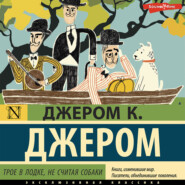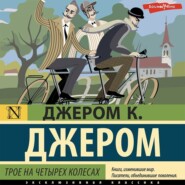По всем вопросам обращайтесь на: info@litportal.ru
(©) 2003-2024.
✖
The Second Thoughts of an Idle Fellow
Настройки чтения
Размер шрифта
Высота строк
Поля
A servant entered at that moment with a cablegram from the manager of one of his Austrian mines, and he had to leave me for his study. But, walking home, I fell to pondering on his words. Why this endless work? Why each morning do we get up and wash and dress ourselves, to undress ourselves at night and go to bed again? Why do we work merely to earn money to buy food; and eat food so as to gain strength that we may work? Why do we live, merely in the end to say good-bye to one another? Why do we labour to bring children into the world that they may die and be buried?
Of what use our mad striving, our passionate desire? Will it matter to the ages whether, once upon a time, the Union Jack or the Tricolour floated over the battlements of Badajoz? Yet we poured our blood into its ditches to decide the question. Will it matter, in the days when the glacial period shall have come again, to clothe the earth with silence, whose foot first trod the Pole? Yet, generation after generation, we mile its roadway with our whitening bones. So very soon the worms come to us; does it matter whether we love, or hate? Yet the hot blood rushes through our veins, we wear out heart and brain for shadowy hopes that ever fade as we press forward.
The flower struggles up from seed-pod, draws the sweet sap from the ground, folds its petals each night, and sleeps. Then love comes to it in a strange form, and it longs to mingle its pollen with the pollen of some other flower. So it puts forth its gay blossoms, and the wandering insect bears the message from seed-pod to seed-pod. And the seasons pass, bringing with them the sunshine and the rain, till the flower withers, never having known the real purpose for which it lived, thinking the garden was made for it, not it for the garden. The coral insect dreams in its small soul, which is possibly its small stomach, of home and food. So it works and strives deep down in the dark waters, never knowing of the continents it is fashioning.
But the question still remains: for what purpose is it all? Science explains it to us. By ages of strife and effort we improve the race; from ether, through the monkey, man is born. So, through the labour of the coming ages, he will free himself still further from the brute. Through sorrow and through struggle, by the sweat of brain and brow, he will lift himself towards the angels. He will come into his kingdom.
But why the building? Why the passing of the countless ages? Why should he not have been born the god he is to be, imbued at birth with all the capabilities his ancestors have died acquiring? Why the Pict and Hun that I may be? Why I, that a descendant of my own, to whom I shall seem a savage, shall come after me? Why, if the universe be ordered by a Creator to whom all things are possible, the protoplasmic cell? Why not the man that is to be? Shall all the generations be so much human waste that he may live? Am I but another layer of the soil preparing for him?
Or, if our future be in other spheres, then why the need of this planet? Are we labouring at some Work too vast for us to perceive? Are our passions and desires mere whips and traces by the help of which we are driven? Any theory seems more hopeful than the thought that all our eager, fretful lives are but the turning of a useless prison crank. Looking back the little distance that our dim eyes can penetrate the past, what do we find? Civilizations, built up with infinite care, swept aside and lost. Beliefs for which men lived and died, proved to be mockeries. Greek Art crushed to the dust by Gothic bludgeons. Dreams of fraternity, drowned in blood by a Napoleon. What is left to us, but the hope that the work itself, not the result, is the real monument? Maybe, we are as children, asking, “Of what use are these lessons? What good will they ever be to us?” But there comes a day when the lad understands why he learnt grammar and geography, when even dates have a meaning for him. But this is not until he has left school, and gone out into the wider world. So, perhaps, when we are a little more grown up, we too may begin to understand the reason for our living.
ON THE CARE AND MANAGEMENT OF WOMEN
I talked to a woman once on the subject of honeymoons. I said, “Would you recommend a long honeymoon, or a Saturday to Monday somewhere?” A silence fell upon her. I gathered she was looking back rather than forward to her answer.
“I would advise a long honeymoon,” she replied at length, “the old-fashioned month.”
“Why,” I persisted, “I thought the tendency of the age was to cut these things shorter and shorter.”
“It is the tendency of the age,” she answered, “to seek escape from many things it would be wiser to face. I think myself that, for good or evil, the sooner it is over – the sooner both the man and the woman know – the better.”
“The sooner what is over?” I asked.
If she had a fault, this woman, about which I am not sure, it was an inclination towards enigma.
She crossed to the window and stood there, looking out.
“Was there not a custom,” she said, still gazing down into the wet, glistening street, “among one of the ancient peoples, I forget which, ordaining that when a man and woman, loving one another, or thinking that they loved, had been joined together, they should go down upon their wedding night to the temple? And into the dark recesses of the temple, through many winding passages, the priest led them until they came to the great chamber where dwelt the voice of their god. There the priest left them, clanging-to the massive door behind him, and there, alone in silence, they made their sacrifice; and in the night the Voice spoke to them, showing them their future life – whether they had chosen well; whether their love would live or die. And in the morning the priest returned and led them back into the day; and they dwelt among their fellows. But no one was permitted to question them, nor they to answer should any do so. Well, do you know, our nineteenth-century honeymoon at Brighton, Switzerland, or Ramsgate, as the choice or necessity may be, always seems to me merely another form of that night spent alone in the temple before the altar of that forgotten god. Our young men and women marry, and we kiss them and congratulate them; and, standing on the doorstep, throw rice and old slippers, and shout good wishes after them; and he waves his gloved hand to us, and she flutters her little handkerchief from the carriage window; and we watch their smiling faces and hear their laughter until the corner hides them from our view. Then we go about our own business, and a short time passes by; and one day we meet them again, and their faces have grown older and graver; and I always wonder what the Voice has told them during that little while that they have been absent from our sight. But of course it would not do to ask them. Nor would they answer truly if we did.”
My friend laughed, and, leaving the window, took her place beside the tea-things, and other callers dropping in, we fell to talk of pictures, plays, and people.
But I felt it would be unwise to act on her sole advice, much as I have always valued her opinion.
A woman takes life too seriously. It is a serious affair to most of us, the Lord knows. That is why it is well not to take it more seriously than need be.
Little Jack and little Jill fall down the hill, hurting their little knees, and their little noses, spilling the hard-earned water. We are very philosophical.
“Oh, don’t cry!” we tell them, “that is babyish. Little boys and little girls must learn to bear pain. Up you get, fill the pail again, and try once more.”
Little Jack and little Jill rub their dirty knuckles into their little eyes, looking ruefully at their bloody little knees, and trot back with the pail. We laugh at them, but not ill-naturedly.
“Poor little souls,” we say; “how they did hullabaloo. One might have thought they were half-killed. And it was only a broken crown, after all. What a fuss children make!” We bear with much stoicism the fall of little Jack and little Jill.
But when we– grown-up Jack with moustache turning grey; grown-up Jill with the first faint “crow’s feet” showing – when we tumble down the hill, and our pail is spilt. Ye Heavens! what a tragedy has happened. Put out the stars, turn off the sun, suspend the laws of nature. Mr. Jack and Mrs. Jill, coming down the hill – what they were doing on the hill we will not inquire – have slipped over a stone, placed there surely by the evil powers of the universe. Mr. Jack and Mrs. Jill have bumped their silly heads. Mr. Jack and Mrs. Jill have hurt their little hearts, and stand marvelling that the world can go about its business in the face of such disaster.
Don’t take the matter quite so seriously, Jack and Jill. You have spilled your happiness, you must toil up the hill again and refill the pail. Carry it more carefully next time. What were you doing? Playing some fool’s trick, I’ll be bound.
A laugh and a sigh, a kiss and good-bye, is our life. Is it worth so much fretting? It is a merry life on the whole. Courage, comrade. A campaign cannot be all drum and fife and stirrup-cup. The marching and the fighting must come into it somewhere. There are pleasant bivouacs among the vineyards, merry nights around the camp fires. White hands wave a welcome to us; bright eyes dim at our going. Would you run from the battle-music? What have you to complain of? Forward: the medal to some, the surgeon’s knife to others; to all of us, sooner or later, six feet of mother earth. What are you afraid of? Courage, comrade.
There is a mean between basking through life with the smiling contentment of the alligator, and shivering through it with the aggressive sensibility of the Lama determined to die at every cross word. To bear it as a man we must also feel it as a man. My philosophic friend, seek not to comfort a brother standing by the coffin of his child with the cheery suggestion that it will be all the same a hundred years hence, because, for one thing, the observation is not true: the man is changed for all eternity – possibly for the better, but don’t add that. A soldier with a bullet in his neck is never quite the man he was. But he can laugh and he can talk, drink his wine and ride his horse. Now and again, towards evening, when the weather is trying, the sickness will come upon him. You will find him on a couch in a dark corner.
“Hallo! old fellow, anything up?”
“Oh, just a twinge, the old wound, you know. I will be better in a little while.”
Shut the door of the dark room quietly. I should not stay even to sympathize with him if I were you. The men will be coming to screw the coffin down soon. I think he would like to be alone with it till then. Let us leave him. He will come back to the club later on in the season. For a while we may have to give him another ten points or so, but he will soon get back his old form. Now and again, when he meets the other fellows’ boys shouting on the towing-path; when Brown rushes up the drive, paper in hand, to tell him how that young scapegrace Jim has won his Cross; when he is congratulating Jones’s eldest on having passed with honours, the old wound may give him a nasty twinge. But the pain will pass away. He will laugh at our stories and tell us his own; eat his dinner, play his rubber. It is only a wound.
Tommy can never be ours, Jenny does not love us. We cannot afford claret, so we will have to drink beer. Well, what would you have us do? Yes, let us curse Fate by all means – some one to curse is always useful. Let us cry and wring our hands – for how long? The dinner-bell will ring soon, and the Smiths are coming. We shall have to talk about the opera and the picture-galleries. Quick, where is the eau-de-Cologne? where are the curling-tongs? Or would you we committed suicide? Is it worth while? Only a few more years – perhaps to-morrow, by aid of a piece of orange peel or a broken chimney-pot – and Fate will save us all that trouble.
Or shall we, as sulky children, mope day after day? We are a broken-hearted little Jack – little Jill. We will never smile again; we will pine away and die, and be buried in the spring. The world is sad, and life so cruel, and heaven so cold. Oh dear! oh dear! we have hurt ourselves.
We whimper and whine at every pain. In old strong days men faced real dangers, real troubles every hour; they had no time to cry. Death and disaster stood ever at the door. Men were contemptuous of them. Now in each snug protected villa we set to work to make wounds out of scratches. Every head-ache becomes an agony, every heart-ache a tragedy. It took a murdered father, a drowned sweetheart, a dishonoured mother, a ghost, and a slaughtered Prime Minister to produce the emotions in Hamlet that a modern minor poet obtains from a chorus girl’s frown, or a temporary slump on the Stock Exchange. Like Mrs. Gummidge, we feel it more. The lighter and easier life gets the more seriously we go out to meet it. The boatmen of Ulysses faced the thunder and the sunshine alike with frolic welcome. We modern sailors have grown more sensitive. The sunshine scorches us, the rain chills us. We meet both with loud self-pity.
Thinking these thoughts, I sought a second friend – a man whose breezy common-sense has often helped me, and him likewise I questioned on this subject of honeymoons.
“My dear boy,” he replied; “take my advice, if ever you get married, arrange it so that the honeymoon shall only last a week, and let it be a bustling week into the bargain. Take a Cook’s circular tour. Get married on the Saturday morning, cut the breakfast and all that foolishness, and catch the eleven-ten from Charing Cross to Paris. Take her up the Eiffel Tower on Sunday. Lunch at Fontainebleau. Dine at the Maison Doree, and show her the Moulin Rouge in the evening. Take the night train for Lucerne. Devote Monday and Tuesday to doing Switzerland, and get into Rome by Thursday morning, taking the Italian lakes en route. On Friday cross to Marseilles, and from there push along to Monte Carlo. Let her have a flutter at the tables. Start early Saturday morning for Spain, cross the Pyrenees on mules, and rest at Bordeaux on Sunday. Get back to Paris on Monday (Monday is always a good day for the opera), and on Tuesday evening you will be at home, and glad to get there. Don’t give her time to criticize you until she has got used to you. No man will bear unprotected exposure to a young girl’s eyes. The honeymoon is the matrimonial microscope. Wobble it. Confuse it with many objects. Cloud it with other interests. Don’t sit still to be examined. Besides, remember that a man always appears at his best when active, and a woman at her worst. Bustle her, my dear boy, bustle her: I don’t care who she may be. Give her plenty of luggage to look after; make her catch trains. Let her see the average husband sprawling comfortably over the railway cushions, while his wife has to sit bolt upright in the corner left to her. Let her hear how other men swear. Let her smell other men’s tobacco. Hurry up, and get her accustomed quickly to the sight of mankind. Then she will be less surprised and shocked as she grows to know you. One of the best fellows I ever knew spoilt his married life beyond repair by a long quiet honeymoon. They went off for a month to a lonely cottage in some heaven-forsaken spot, where never a soul came near them, and never a thing happened but morning, afternoon, and night. There for thirty days she overhauled him. When he yawned – and he yawned pretty often, I guess, during that month – she thought of the size of his mouth, and when he put his heels upon the fender she sat and brooded upon the shape of his feet. At meal-time, not feeling hungry herself, having nothing to do to make her hungry, she would occupy herself with watching him eat; and at night, not feeling sleepy for the same reason, she would lie awake and listen to his snoring. After the first day or two he grew tired of talking nonsense, and she of listening to it (it sounded nonsense now they could speak it aloud; they had fancied it poetry when they had had to whisper it); and having no other subject, as yet, of common interest, they would sit and stare in front of them in silence. One day some trifle irritated him and he swore. On a busy railway platform, or in a crowded hotel, she would have said, ‘Oh!’ and they would both have laughed. From that echoing desert the silly words rose up in widening circles towards the sky, and that night she cried herself to sleep. Bustle them, my dear boy, bustle them. We all like each other better the less we think about one another, and the honeymoon is an exceptionally critical time. Bustle her, my dear boy, bustle her.”
My very worst honeymoon experience took place in the South of England in eighteen hundred and – well, never mind the exact date, let us say a few years ago. I was a shy young man at that time. Many complain of my reserve to this day, but then some girls expect too much from a man. We all have our shortcomings. Even then, however, I was not so shy as she. We had to travel from Lyndhurst in the New Forest to Ventnor, an awkward bit of cross-country work in those days.
“It’s so fortunate you are going too,” said her aunt to me on the Tuesday; “Minnie is always nervous travelling alone. You will be able to look after her, and I shan’t be anxious.”
I said it would be a pleasure, and at the time I honestly thought it. On the Wednesday I went down to the coach office, and booked two places for Lymington, from where we took the steamer. I had not a suspicion of trouble.
The booking-clerk was an elderly man. He said —
“I’ve got the box seat, and the end place on the back bench.”
I said —
“Oh, can’t I have two together?”
He was a kindly-looking old fellow. He winked at me. I wondered all the way home why he had winked at me. He said —
“I’ll manage it somehow.”
I said —
“It’s very kind of you, I’m sure.”
He laid his hand on my shoulder. He struck me as familiar, but well-intentioned. He said —
“We have all of us been there.”
I thought he was alluding to the Isle of Wight. I said —
“And this is the best time of the year for it, so I’m told.” It was early summer time.
He said – “It’s all right in summer, and it’s good enough in winter —while it lasts. You make the most of it, young ’un;” and he slapped me on the back and laughed.

















